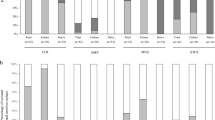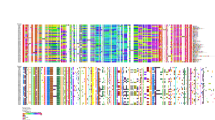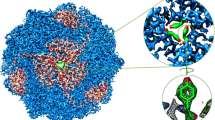Abstract
Resistance to metronidazole (MTZ) in Helicobacter pylori is associated with mutations in rdxA, encoding an oxygen-insensitive NADPH nitroreductase, and mutations in frxA, encoding a NAD(P)H-flavin oxidoreductase. Despite this association, the strict correlation of MTZ resistance with mutations in rdxA or frxA is still controversial. In this study, rdxA allelic replacement was used to distinguish resistance-associated nucleotide mutations from the natural genetic diversity of H. pylori. Replacement with truncated rdxA resulted in MTZ resistance, whereas replacement with missense-mutated rdxA from resistant clinical isolates failed to yield MTZ resistance. Thus, although truncation of rdxA confers MTZ resistance in G27 H. pylori, MTZ resistance found in other clinical isolates is not due to the identified amino-acid substitutions. Three of our MTZ-resistant clinical isolates expressed functional rdxA and two of these also encoded full-length frxA. Therefore, MTZ resistance can arise in H. pylori possessing functional rdxA, suggesting that other factors are involved in MTZ resistance.
Similar content being viewed by others
Log in or create a free account to read this content
Gain free access to this article, as well as selected content from this journal and more on nature.com
or
Accession codes
References
Warren, J. R. & Marshall, B. J. Unidentified curved bacilli on gastric epithelium in active chronic gastritis. Lancet 1, 1273–1275 (1983).
Bereswill, S., Krainick, C., Stahler, F., Herrmann, L. & Kist, M. Analysis of the rdxA gene in high-level metronidazole-resistant clinical isolates confirms a limited use of rdxA mutation as a marker for prediction of metronodazole resistance in Helicobacter pylori. FEMS Immunol. Med. Microbiol. 36, 193–198 (2003).
Crump, M., Gospodarowicz, M. & Shepherd, F. A. Lymphoma of the gastrointestinal tract. Semin. Oncol. 26, 324–337 (1999).
Debets-Ossenkopp, Y. J. et al. Insertion of mini-IS605 and deletion of adjacent sequence in the nitroreductase (rdxA) gene cause metronidazole resistance in Helicobacter pylori NCTC11637. Antimicrob. Agents Chemother. 43, 2657–2663 (1999).
Parsonnet, J. Helicobacter pylori. Infect. Dis. Clin. North Am. 12, 185–197 (1998).
Parsonnet, J. Helicobacter pylori: the size of the problem. Gut 43, S6–S9 (1998).
Chiba, N., Rao, B. V., Rademaker, J. W. & Hunt, R. H. Meta-analysis of the efficacy of antibiotic therapy in eradicating Helicobacter pylori. Am. J. Gastroenterol. 87, 1716–1727 (1992).
Houben, M. H. et al. A systematic review of Helicobacter pylori eradication therapy––the impact of antimicrobial resistance on eradication rates. Aliment. Pharmacol. Ther. 13, 1047–1055 (1999).
Glupczynski, Y. Antimicrobial resistance in Helicobacter pylori: a global overview. Acta. Gastroenterol. Belg. 61, 357–366 (1998).
Miyaji, H. et al. Susceptibility of Helicobacter pylori isolates to metronidazole, clarithromycin and amoxycillin in vitro and in clinical treatment in Japan. Aliment. Pharmacol. Ther. 11, 1131–1136 (1997).
Goddard, A. F. & Logan, R. P. Antimicrobial resistance and Helicobacter pylori. J. Antimicrob. Chemother. 37, 639–643 (1996).
Mégraud, F. et al. Antimicrobial susceptibility testing of Helicobacter pylori in a large multicenter trial: the MACH 2 study. Antimicrob. Agents Chemother. 43, 2747–2752 (1999).
Edwards, D. I. Nitroimidazole drugs—action and resistance mechanisms. I. Mechanisms of action. J. Antimicrob. Chemother. 31, 9–20 (1993).
Samuelson, J. Why metronidazole is active against both bacteria and parasites. Antimicrob. Agents Chemother. 43, 1533–1541 (1999).
Townson, S. M., Boreham, P. F., Upcroft, P. & Upcroft, J. A. Resistance to the nitroheterocyclic drugs. Acta. Trop. 56, 173–194 (1994).
Edwards, D. I. Nitroimidazole drugs—action and resistance mechanisms. II. Mechanisms of resistance. J. Antimicrob. Chemother. 31, 201–210 (1993).
Lockerby, D. L., Rabin, H. R. & Laishley, E. J. Role of the phosphoroclastic reaction of Clostridium pasteurianum in the reduction of metronidazole. Antimicrob. Agents Chemother. 27, 863–867 (1985).
Declerck, P. J., De Ranter, C. J. & Volckaert, G. Base specific interaction of reductively activated nitroimidazoles with DNA. FEBS Lett. 164, 145–148 (1983).
Declerck, P. J. & De Ranter, C. J. In vitro reductive activation of nitroimidazoles. Biochem. Pharmacol. 35, 59–61 (1986).
Kedderis, G. L., Argenbright, L. S. & Miwa, G. T. Mechanism of reductive activation of a 5-nitroimidazole by flavoproteins: model studies with dithionite. Arch. Biochem. Biophys. 262, 40–48 (1988).
Jeong, J. Y. et al. Sequential inactivation of rdxA (HP0954) and frxA (HP0642) nitroreductase genes causes moderate and high-level metronidazole resistance in Helicobacter pylori. J. Bacteriol. 182, 5082–5090 (2000).
Kwon, D. H. et al. Analysis of rdxA and involvement of additional genes encoding NAD(P)H flavin oxidoreductase (FrxA) and ferredoxin-like protein (FdxB) in metronidazole resistance of Helicobacter pylori. Antimicrob. Agents Chemother. 44, 2133–2142 (2000).
Yang, Y. J., Wu, J. J., Sheu, B. S., Kao, A. W. & Huang, A. H. The rdxA gene plays a more major role than frxA gene mutation in high-level metronidazole resistance of Helicobacter pylori in Taiwan. Helicobacter. 9, 400–407 (2004).
Xiang, Z. et al. Analysis of expression of CagA and VacA virulence factors in 43 strains of Helicobacter pylori reveals that clinical isolates can be divided into two major types and that CagA is not necessary for expression of the vacuolating cytotoxin. Infect. Immun. 63, 94–98 (1995).
Jeong, J. Y., Mukhopadhyay, A. K., Akada, J. K., Dailidiene, D., Hoffman, P. S. & Berg, D. E. Roles of FrxA and RdxA nitroreductases of Helicobacter pylori in susceptibility and resistance to metronidazole. J. Bacteriol. 183, 5155–5162 (2001).
Ferrero, R. L., Cussac, V., Courcoux, P. & Labigne, A. Construction of isogenic urease-negative mutants of Helicobacter pylori by allelic exchange. J. Bacteriol. 174, 4212–4217 (1992).
Clayton, C. L. & Mobley, H. L. T. Helicobacter pylori Protocols (Humana Press, Totowa, 1997).
Kwon, D. H., Kato, M., El-Zaatari, F. A., Osato, M. S. & Graham, D. Y. Frame-shift mutations in NAD(P)H flavin oxidoreductase encoding gene (frxA) from metronidazole resistant Helicobacter pylori ATCC43504 and its involvement in metronidazole resistance. FEMS Microbiol. Lett. 188, 197–202 (2000).
Mendz, G. L. & Megraud, F. Is the molecular basis of metronidazole resistance in microaerophilic organisms understood? Trends Microbiol. 10, 370–375 (2002).
Solca, N. M., Bernasconi, M. V. & Piffaretti, J. C. Mechanism of metronidazole resistance in Helicobacter pylori: comparison of the rdxA gene sequences in 30 strains. Antimicrob. Agents Chemother. 44, 2207–2210 (2000).
Kwon, D. H. et al. DNA sequence analysis of rdxA and frxA from 12 pairs of metronidazole-sensitive and -resistant clinical Helicobacter pylori isolates. Antimicrob. Agents Chemother. 45, 2609–2615 (2001).
Paul, R., Postius, S., Melchers, K. & Schafer, K. P. Mutation of the Helicobacter pylori genes rdxA and pbp1 cause resistance against metronidazole and amoxicillin. Antimicrob. Agents Chemother. 45, 962–965 (2001).
Marais, A., Bilardi, C., Cantet, F., Mendz, G. L. & Megraud, F. Characterization of the genes rdxA and frxA involved in metronidazole resistance in Helicobacter pylori. Res. Microbiol. 154, 137–144 (2003).
Hoffman, P. S., Goodwin, A., Johnsen, J., Magee, K. & Veldhuyzen van Zanten, S. J. Metabolic activities of metronidazole-sensitive and -resistant strains of Helicobacter pylori: repression of pyruvate oxidoreductase and expression of isocitrate lyase activity correlate with resistance. J. Bacteriol. 178, 4822–4829 (1996).
Jorgensen, M. A., Trend, M. A., Hazell, S. L. & Mendz, G. L. Potential involvement of several nitroreductases in metronidazole resistance in Helicobacter pylori. Arch. Biochem. Biophys. 392, 180–191 (2001).
Kaihovaara, P., Hook-Nikanne, J., Uusi-Oukari, M., Kosunen, T. U. & Salaspuro, M. Flavodoxin-dependent pyruvate oxidation, acetate production and metronidazole reduction by Helicobacter pylori. J. Antimicrob. Chemother. 41, 171–177 (1998).
Trend, M. A., Jorgensen, M. A., Hazell, S. L. & Mendz, G. L. Oxidases and reductases are involved in metronidazole sensitivity in Helicobacter pylori. Int. J. Biochem. Cell. Biol. 33, 143–153 (2001).
Alm, R. A. et al. Genomic-sequence comparison of two unrelated isolates of the human gastric pathogen Helicobacter pylori. Nature 397, 176–180 (1999).
Marais, A., Mendz, G. L., Hazell, S. L. & Megraud, F. Metabolism and genetics of Helicobacter pylori: the genome era. Microbiol. Mol. Biol. Rev. 63, 642–674 (1999).
Tomb, J. F. et al. The complete genome sequence of the gastric pathogen Helicobacter pylori. Nature 388, 539–547 (1997).
van Amsterdam, K., Bart, A. & van der Ende, A. A Helicobacter pylori TolC efflux pump confers resistance to metronidazole. Antimicrob. Agents Chemother. 49, 1477–1482 (2005).
Acknowledgements
We thank Joong-Chul Lee for the gift of plasmid pILL600, Doug Berg for helpful suggestions and H Gancz and B Carpenter for a critical reading of the paper. This study was supported by the Korea Research Foundation Grant, which was funded by the Korean Government (MOEHRD) (KRF-2006-311-E00083).
Author information
Authors and Affiliations
Corresponding authors
Rights and permissions
About this article
Cite this article
Kim, S., Joo, Y., Lee, H. et al. Genetic analysis of Helicobacter pylori clinical isolates suggests resistance to metronidazole can occur without the loss of functional rdxA. J Antibiot 62, 43–50 (2009). https://doi.org/10.1038/ja.2008.6
Received:
Accepted:
Published:
Issue date:
DOI: https://doi.org/10.1038/ja.2008.6
Keywords
This article is cited by
-
Clinical relevance of the cagA and vacA s1m1 status and antibiotic resistance in Helicobacter pylori: a systematic review and meta-analysis
BMC Infectious Diseases (2022)
-
Helicobacter pylori infection and antibiotic resistance — from biology to clinical implications
Nature Reviews Gastroenterology & Hepatology (2021)
-
Prevalence of clarithromycin resistance in Helicobacter pylori in Santiago, Chile, estimated by real-time PCR directly from gastric mucosa
BMC Gastroenterology (2018)
-
Primary Antibiotic Resistance of Helicobacter pylori in China
Digestive Diseases and Sciences (2017)
-
Complementation system for Helicobacter pylori
The Journal of Microbiology (2011)



